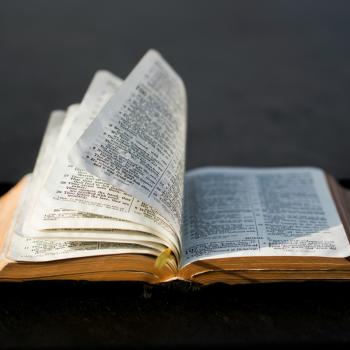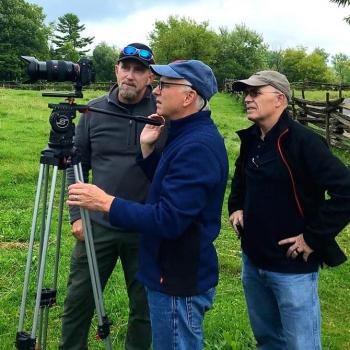As I have been working on my recent article on polygamy in Mitt Romney's family history, "Plural Lives: Mitt Romney's Polygamous Heritage," I have been continually reminded that the 19th-century LDS church was profoundly different from the 20th- and 21st-century LDS church. Anyone who reads primary documents in Mormon history will run into this constantly. The examples are numerous; adoption of men into other men's eternal families, feminine blessing and healing, different attitudes toward the Word of Wisdom (including ignoring it, on occasion), fast meetings on Thursdays, the view of the church as a political kingdom, including leaders overtly guiding members in how they should vote (and having a one-party system in Utah for many years) spring to mind. Of course, polygamy is a major example. However, a related principle of the 19th-century church, which made polygamy possible, is what historian D. Michael Quinn calls "theocratic ethics" (The Mormon Hierarchy: Origins of Power, 88-89, 634).
"Theocratic ethics" hold that the law of God (in Mormonism, the counsel of prophetic church leaders) always takes precedence over the law of the land, if they are in conflict. In addition, "theocratic ethics" sometimes allow a higher religious law to take precedence over another religious law. In other words, God can say "Thou shalt not kill" in one part of the Torah; but in another part of the Torah, God can command holy war, which includes killing enemies in a thoroughgoing way (Dt. 20:16-18).
Polygamy required a pervading acceptance of theocratic ethics because plural marriage was illegal through most of the 19th century. It was banned by state law in Illinois in the 1840s; beginning in 1862 it became illegal on the federal level, when President Abraham Lincoln signed the Morrill Anti-Bigamy Act into law. From 1862 to approximately 1904, Mormons simply ignored federal law. They argued that anti-polygamy legislation was unconstitutional, of course. Yet even after they sent a test case to the Supreme Court, and the Supreme Court ruled against the legality of Mormon polygamy in Reynolds v. United States (1878), Mormons did not stop practicing it. Rudger Clawson, the first Mormon polygamist to be tried and sentenced under the 1882 Edmunds Act, and later an apostle, gave a classic expression of Mormon theocratic ethics. When he was sentenced, he said, "I very much regret that the laws of my country should come in conflict with the laws of God, but whenever they do I shall invariably choose the latter."
Theocratic ethics can require bending or hiding the truth for a perceived higher good, or even telling untruths. This happens frequently in espionage; we regard those who practice deception as spies to be patriotic and heroic, especially given the dangers they undergo. B. Carmon Hardy's remarkable book on post-Manifesto polygamy, Solemn Covenant: The Mormon Polygamous Passage, devotes an appendix to "public truth conflicts" during that fascinating transitional period (363-88). As authorized polygamy went underground after polygamy was publicly, officially ended in 1890, one could not openly admit to contracting, encouraging, or performing new plural marriages.
Polygamy was a really remarkable seventy-year run of theocratic ethics in 19th-century American history. Of course, Mitt Romney's ancestors, from great-great-grandfather Parley P. Pratt to great-grandfathers Miles Park Romney and Parley's son Helaman, were in the middle of this dramatic struggle. Miles Park and Helaman left America to live plural marriage without legal jeopardy (though they continued to practice theocratic ethics in Mexico, as polygamy was also illegal there).
Another remarkable example of theocratic ethics in Mitt Romney's family history is the murder of Squire Brassfield, a non-Mormon visitor in Salt Lake City who legally married a plural wife of Mitt's great-great-grandfather, Archibald Hill (at the time on a mission in England). (See Connell O'Donovan's "'Let This Be a Warning to All Niggers': The Life and Murder of Thomas Coleman in Theocratic Utah," 23nr8. O'Donovan is preparing a separate study of Brassfield's murder. See also Kathryn Daynes, More Wives Than One: Transformation of the Mormon Marriage System, 201.) Miles Park Romney, Hill's son-in-law, brought proceedings for theft against Brassfield. These were dismissed. But while the non-Mormon was returning to his hotel after a court appearance, he was shot down by an unknown assailant, presumably a close relative of Hill. Such murders of perceived seducers of plural wives were regarded as justified in 19th-century Utah. (See also Kenneth L. Cannon II, "Mountain Common Law: The Extralegal Punishment of Seducers in Early Utah," Utah Historical Quarterly 51.4 (fall 1983): 310-17, 326; and Terryl Givens and Matthew J. Grow, Parley P. Pratt: the Apostle Paul of Mormonism, pp. 373-74.) I conclude that this murder, as well as the oddly parallel murder of Parley P. Pratt, show the difficulty of living in a culture with two conflicting marriage systems.



